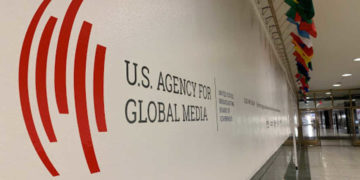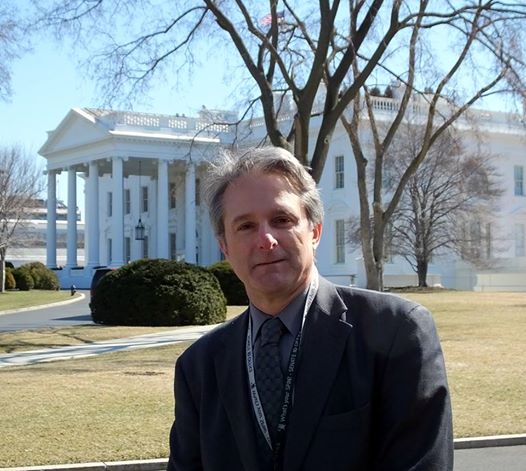Commentary By Dan Robinson
Inspector General reports likely don’t rank high on anyone’s list of favorite reading material, and reports dealing with the U.S. Agency for Global Media (USAGM) are not something editors at media organizations are likely to add to the urgent assignments column.
But for those familiar with the issues at this perennially-troubled and mismanaged agency, the latest State Department Office of Inspector General (OIG) investigation contains some headlines that are worth some attention.
SOME HISTORY
Back in 2021, during the first full year of the Biden administration’s control of USAGM, the OIG sent an “inspection team” to the agency. The mission was to assess: “USAGM Compliance with Editorial Independence and Journalistic Standards and Principles.”
Tumultuous would be too kind a word to describe the atmosphere at the agency in 2020 and 2021, and it’s almost too much to retell here.
After Donald Trump’s CEO of USAGM, Michael Pack, removed managers of USAGM entities – RFE/RL, Radio Free Asia, Open Technology Fund, and others, installing his own choices, the former officials conducted an extended legal battle with Pack.
Following the presidential election, Biden administration-approved acting managers of the agency re-installed the dismissed officials. The OIG and other outside groups issued reports condemning Pack for various alleged transgressions and abuses of authority.
But one issue of major concern to Pack was political bias in news content at VOA. This was not something he had just dreamed up. USAGM Watch (formerly BBG Watch) had been reporting about this for years.
ALERTED TO BIAS PROBLEM, OIG LIMITED SCOPE OF PROBE
Some VOA staffers were seen to have demonstrated personal political biases in their reports, including social media posts. A few examples made headlines, such as a VOA Urdu language video that carried water for Joe Biden prior to the 2020 election.
During the Trump administration, social media posts by some VOA correspondents were ordered taken down (agency managers had to be alerted to these by outside observers) because they violated VOA’s News Standards and Best Practices guidelines.
Because of an established record on the part of the agency’s embedded bureaucrats of deception and attempting to conceal longstanding problems and mismanagement, I was concerned that the OIG could end up being duped by agency managers.
Contacted shortly after its inspection was announced, the OIG stated that it would “not be assessing actual journalistic content itself nor looking at the impact of that content on audiences or its effectiveness.”
The inspection would focus on: “The oversight processes and procedures that USAGM and the networks have in place regarding editorial independence, including the editorial standards outlined in 22 CFR 531 (June-October 2020), and journalistic standards and principles.”
Wow. So, on what was perhaps one of the most controversial issues – USAGM’s inability to efficiently police its own content and the potential impact that it had on audiences, it seemed OIG might be taking the easy path and ignoring important details.
In the case of Voice of America, I informed OIG that there is a “News Standards and Best Practices Guide”. In existence for many years, it is supposed to be the bedrock of standards and also serves as a model for other non-VOA USAGM entities.
TOOTHLESS ENFORCEMENT AND PERCEPTION OF BIASED COVERAGE
As reporting by the independent watchdog website BBG Watch (now USAGM Watch) revealed, the record was replete with examples of violations. Entrenched bureaucrats ignored many cases of abuse, facilitating more violations of these standards.
If OIG truly wanted to have an impact that could help ensure change for the better, I suggested it should thoroughly examine this history, especially when the absence of competent enforcement resulted in political biases being injected into program content.
And I warned that the entrenched bureaucracy liked to avoid the detailed scrutiny required for lasting reforms. Congress too had not paid sufficient attention, though the language in defense policy legislation (the NDAA) required more monitoring for violations.
Among numerous URLs sent to OIG was my article from 2020 revealing the existence of an executive summary of a report completed in 2016 by a three-person panel hired by then VOA director Amanda Bennett.
That summary stated: “The perception of biased coverage is real among multiple VOA reporters and editors,” the summary stated. “It’s vital that VOA leadership take visible steps to communicate that bias is unacceptable and that the integrity of VOA reporting is sacrosanct.”
To this day, Bennett – who took over as CEO in October – has not released the full report upon which the executive summary was based, though it contained that warning about political bias in VOA content.
Another article link provided to OIG from 2015 covered the issue of advocacy journalism by VOA’s federal employees and the lack of action against it by agency managers.
OIG ON LAPSES IN JOURNALISTIC STANDARDS AND ENFORCEMENT
A prodigious number of standards abuses occurred at VOA during her time there between 2016 and 2020. Yet, Democrat, as well as Republican senators, allowed her to glide through her nomination hearing, failing to ask any tough questions of her in public session. Senate Foreign Relations Committee Chairman, Senator Robert Menendez (D-NJ) hinted at concerns over Amanda Bennett’s performance at the Voice of America but ultimately voted to confirm her nomination.
One concern that received major media attention with an article in The Washington Post, with which Bennett has close connections, involved plagiarism. The OIG report highlights the issue to explain this significant problem at VOA and the agency as a whole.
The report rightly focused on what I call one of the dirty little secrets (perhaps not so secret) – that “a lack of a clear definition of the [VOA] Standards Editor’s authority risks compromising VOA’s commitment to uphold the highest journalistic standards.”
The OIG goes on to identify weaknesses in how journalistic standards are enforced, or not, at VOA and the Office of Cuba Broadcasting (Radio/TV Marti).
To quote from the report: “[USAGM networks] generally had appropriate oversight of editorial controls, program reviews, and procedures to respond to violations of journalistic standards and principles, with exceptions at OCB and the Voice of America (VOA).” But though all networks delivered training on standards, “the quality and frequency varied”.
OIG shines some light on the flawed program review system at VOA, which, as many current and former employees know, was essentially taken apart some years ago.
“VOA’s Annual Program Reviews were Inconsistently Implemented,” says OIG, adding that
“the process for VOA’s annual program reviews for language services lacked consistent implementation,” and that “the lack of a consistent and comprehensive program review process risks overlooking journalistic standards deficiencies in language service content.”
[VOA] lacked written procedures for addressing lapses in journalistic standards [and] had“no written procedures on the roles and responsibilities of VOA personnel or USAGM offices involved in addressing allegations,” the report said.
In addition, “the lack of written guidance occurred because VOA traditionally used oral instructions to communicate many routine procedures. However, in the absence of written procedures, VOA staff gave OIG inconsistent responses for how to report lapses and how allegations would be addressed.”
OIG hit the nail on the head by noting that this lack of written procedures “contributed to delays in addressing alleged lapses noting that “although initial suspicions of plagiarism by a contract reporter arose in July 2020, VOA did not review the issue until the allegations resurfaced in November 2020. Subsequently, neither the network nor USAGM acted until 7 months later, in June 2021, after being contacted by an outside journalist…”
Still more: “Without written procedures governing the process for addressing journalistic standards violations, VOA risks compromising its commitment to uphold the highest journalistic standards.”
Where VOA’s editor for standards (Steve Springer, ex-CNN and al-Jazeera, has held the position for years) was concerned, though “his scope of responsibility was extensive, authority was unclear to staff” adding that this authority “rested on a shared, unwritten agreement that VOA would implement the editor’s journalistic standards guidance. As a result, the editor did not have the authority to ensure compliance.”
HEADLINE: INEFFECTIVE ENFORCEMENT INSTITUTIONALIZED, RISKS COMPROMISING COMMITMENT TO HIGHEST JOURNALISTIC STANDARDS
So, the biggest headline from OIG: official recognition of toothless enforcement capabilities that became institutionalized for years, though independent outside citizen journalists attempted to draw attention to it for years.
OIG also quoted [agency] employees as telling its investigators that staff of VOA’s language offices “occasionally ignored guidance, including from VOA’s Standards and Best Practices Guide, and had not taken corrective action on standards violations.”
On plagiarism, “despite learning of a case of suspected plagiarism in the Africa Division in February 2020, which the Standards Editor confirmed that same month, VOA did not remove the related content until 8 months later.”
“Confusion over roles and responsibilities, including that of the Standards Editor, contributed to the delay. Lack of a clear definition of the Standards Editor’s authority risks compromising VOA’s commitment to uphold the highest journalistic standards.”
As former USAGM employees know all too well, it’s always dangerous when the agency’s entrenched bureaucrats claim to have resolved, or be working on resolving, issues revealed by government investigations.
OIG TO USAGM: GET YOUR SH….T TOGETHER
Among nine recommendations, OIG directs [VOA] to “clarify the roles and authorities of the Standards Editor in implementing standards-related guidance for all staff.”
Most of the recommendations have to do not with the issue of the understanding among agency staff of how the “firewall” works – a reference to preventing political interference with content, but with journalistic standards.
And much of the focus in the OIG report is on USAGM’s office for Cuba broadcasting, which memorably in 2019 fired eight of its staff after the publication of what the agency itself described as an “egregiously false and anti-Semitic” video on George Soros.
Former acting USAGM CEO Kelu Chao concurred with a recommendation that OCB implement a strategic communication plan that conveys journalistic standards, objectives, and priorities to staff, asserting that OCB “estimated completion in FY 2023.
OIG also directed USAGM to “[create] written policies or procedures that define the editorial review process to ensure that all content is reviewed before broadcast.” The agency says completion of this would also be in FY 2023.
The agency is also ordered to ensure that OCB “develop and disseminate to staff written procedures governing how journalistic standards lapses will be addressed, as well as the roles and responsibilities of the various personnel and offices involved,” along with training on journalistic standards and principles.
VOA’s program review system, such that it exists, is to be tightened, with OIG directing that “all language services…complete the annual program reviews according to network and U.S. Agency for Global Media policies”. VOA should “[develop and distribute] to staff a written action plan for each annual program review, to include how action items will be implemented and enforced.”
On toothless enforcement of standards, the OIG orders that VOA “clarify the roles and authorities of the Standards Editor in implementing standards-related guidance for all staff.”
HAS USAGM EVER REMOVED ANY EMPLOYEE FOR VIOLATIONS?
At this point, we should recall that USAGM has never revealed whether a single employee has been fired from federal service for violations of news standards, such as politically biased opinions in the social media posts of employees.
VOA’s News Standards and Best Practices Guide makes clear that violations can result in removal.
But VOA’s acting director Yolanda Lopez never followed up on her press release saying that an internal review was underway “to assess the handling of this matter and to ensure that any future incidents will be dealt with promptly and appropriately.”
What is not seen in the agency’s response to the OIG report is an explanation of why key managers, including Chao and Bennett, failed to detect and deal aggressively with standards violations and editorial control problems during the years they were in charge.
USAGM OFFICIALS PLAY BLAME GAME
Since the Biden administration restored various network leaders in 2021, agency officials have used Town Hall and other internal sessions to continue blaming Michael Pack for being too aggressive in addressing the bias problem.
By appearances, there’s been little introspection about what led to the most serious scandals at the agency. Sources report that bias in content continues to be a problem, up to and including senior editors in VOA’s central newsroom.
In 2020, Michael Pack also took the step of releasing to the public a joint OPM/ODNI report that revealed the extent to which the agency had failed to follow guidelines for employee background investigations. Entrenched bureaucrats knew it was a ticking time bomb for the agency, which lost its authority to conduct background checks.
But Pack’s actions ended up being labeled only as an attack on journalistic independence and the firewall. Yet, as the OIG report confirms, the agency operated for years with unclear definitions and assumptions about this firewall and ineffective detection and enforcement of news standards.
OIG DELAY HELPED BENNETT AVOID DETAILED QUESTIONING
So, while it leaves out a lot of detail that would fully inform taxpayers, this OIG report has far more significance than initially meets the eye, focusing on issues the origins of which go back years before the Trump administration briefly controlled USAGM for a few months in 2020.
Importantly, VOA and the agency’s various networks remained under the effective control of Obama-era appointees. John Lansing (now running NPR) was CEO until 2019. Amanda Bennett remained in charge of VOA until mid-2020.
It remains to be seen whether establishment print, TV, and online media, all of whom spent much time condemning Donald Trump’s USAGM CEO, pay the OIG report the attention it deserves. History shows that conservative media outlets more consistently write about the agency that costs taxpayers $800 million plus a year.
That the State Department OIG delayed the release of its report until just after Bennett took over the agency raises questions too. It’s not unreasonable to ask whether USAGM may have pressed for the delay to help Bennett avoid embarrassing questions at her nomination hearing.
Members of Congress from both parties could have used such questions during that hearing, which became little more than a rubber stamp exercise. House and Senate Republicans had a long list of questions for Bennett.
Early statements by Bennett as CEO to agency staff have made no mention of the OIG report. She says she is “determined to continue to advance the important work of the agency.”
Bennett includes among priorities “training and ethics” and ensuring that the agency’s “journalism meets the highest possible standards and ethics.” She also asserts she is committed to transparency.
For starters, she might consider releasing the full consultants’ report, produced at her order in 2016, that sounded an alarm about bias in VOA content. She must have it somewhere in her files. It was produced at taxpayer expense. And she could explain why the agency she now heads obstructed attempts by independent journalists to obtain it.
Clearing the air on this would be a welcome step toward the transparency she claims to support as someone who could end up running USAGM for much of the next decade, should political conditions permit it.










